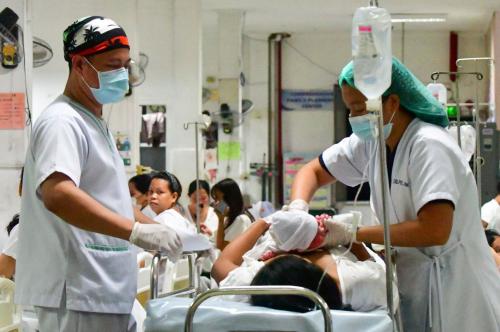
The Philippines and Denmark on Monday inked a deal to further discuss how they could cooperate to develop the education of Filipino healthcare workers, and how they could be deployed to other countries with “safe, transparent and ethical labor mobility” standards.
The joint declaration of intent between Manila and Copenhagen “is just a step forward to deepen our bilateral labor relations,” Department of Migrant Workers (DMW) Secretary Hans Cacdac told reporters after the signing event in Makati.
“The Danish side and the Philippine side are looking into how they can invest in terms of developing our own labor market in the country,” he said.
“We are more aggressive in engaging countries hosting OFWs,” he said.
“We know for sure that if we engage host countries, then we also heighten the protection and welfare of OFWs who are currently there and those who are about to be deployed,” he said.
Manila and Copenhagen have yet to finalize the details of the potential new program for Filipino healthcare workers seeking to work in the Danish Kingdom, but “there is strong agreement that what we need is to develop a sustainable model, which allows benefits for both sides,” Danish Ambassador to the Philippines Franz-Michael Mellbin said in a separate interview.
“We need care workers and nurses for Denmark, but the Philippines also needs to educate more healthcare workers, but maybe also upgrade the education that is taking place,” he said.
“Language is our barrier,” he said.
When asked how many Filipino health workers Denmark was looking to employ, Mellbin said: “I don't like to put a specific number. We are cautious.”
“We would like to have a controlled intake also because it is important for the sending country to have a good overview of how many we are drawing out,” he said.
“We will probably go for batches of 50 or 100 at a time,” he added.
Denmark is also keen to find ways on how returning Filipinos can “actually be reintegrated back into the Filipino healthcare system,” the ambassador said.
“A lot of the healthcare talent who come back to the Philippines do not return to the healthcare sector because they find it difficult to reintegrate to the Filipino system,” he said.
“We think we can find ways to alleviate that,” he said.
The DMW “will have a thorough discussion with the Danish side as well as our internal stakeholders from the Department of Health and the Department of Foreign Affairs,” Cacdac said.
“The timelines have yet to be discussed. There is a pending bilateral labor agreement,” he said, noting that Manila wants to have a “complaints mechanism in case there are issues and concerns for those who will be deployed to Denmark.”
“It is of best interest to both sides that bilateral labor relations are deepened,” he said.
“There is no other way but up. There is no other way but to pursue deepening relations with the Danish side and that is something we are looking forward to,” he said.
There are 37,000 Filipino seafarers working aboard Danish-flag ships and 14,000 other Filipinos in Denmark, according to data from the DMW.
The European country hires about 300 new Filipino workers annually, data showed.